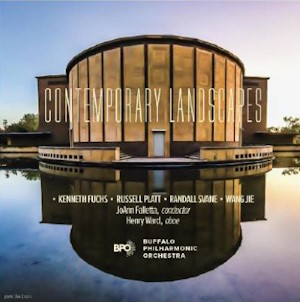
Contemporary Landscapes
Kenneth Fuchs (b. 1956)
Point of Tranquillity (2020)
Russell Platt (b. 1965)
Symphony in Three Movements (For Clyfford Still) (2019/20)
Randall Svane (b. 1972)
Concerto for Oboe and Orchestra (2023)
Wang Jie (b. 1980)
The Winter That United Us (2022)
Henry Ward (oboe)
Buffalo Philharmonic Orchestra/JoAnn Falletta
rec. 2022/24, Kleinhans Music Hall, Buffalo, USA
Beau Fleuve Records [60]
Here we have four works composed for the Buffalo Philharmonic in the last few years. Of the composers, I’d heard only of Kenneth Fuchs, as his music has received some recording attention from Chandos (review ~ review). The work presented here, which is inspired by a painting of the same name by American artist Morris Louis, is also included on the second of the Chandos recordings. The work was originally scored for wind band, and expanded to the full orchestra by Fuchs, following a request by JoAnn Falletta. The painting is an abstract, with swirls of colours, and the music does have a strong feeling of flowing and swirling without any defined start or finish. It is the first work by Fuchs I’d heard, and it has impressed me with its subtle orchestral colours and melodic lines. However, I would suggest that at eleven minutes, it is probably more extended than it needs to be.
The opening movement of Russell Platt’s Symphony provides a substantial contrast to the Fuchs, with its jerky Stravinskyian rhythms and driving percussion. It is another work with an artistic inspiration, and another American abstract painter, in this instance Clyfford Still, a considerable number of whose works are held by the Albright-Knox Gallery in Buffalo. The four paintings which apparently inspired Platt seem fairly similar to my untutored eye – jagged blocks of colour on a plain background – but there is a good variation of style, atmosphere and orchestral colour in the music. As I have said, the opening Feroce is very much in Rite of Spring mode, but the string-dominated Chaconne has a quite different feel. It opens with a gentle flowing melody that slowly becomes darker, and a sense of unease develops. The last few minutes are increasingly agitated, and it climaxes with a huge bass drum strike, the only percussion in the movement as far as I could tell. Without wanting to suggest any specific musical connection, the movement brought to mind Bernard Hermann’s score for Psycho. The Finale is something of a composite, style-wise, of the first two movements, and perhaps the least successful.
One of my favourite pieces of music is the oboe concerto Inflight Entertainment by contemporary Australian composer Graeme Koehne. Randall Svane’s Oboe Concerto (an orchestration of his Oboe Sonata) thus has the unenviable task of being compared (in my mind at least) to Koehne’s. There is no doubt that there is a great deal of beautiful writing for the solo instrument here, but I feel that there is not sufficient variety across the eighteen minutes, especially the first two movements Flowing and Very Slow. Even in the final movement, Quick and Light, there are a number of sections where we go back to slow and flowing. Koehne said of his concerto that he wanted to take the oboe out of its usual pastoral mode, which is where Svane’s sits very comfortably (perhaps a little too comfortably).
The notes equivocate on the inspiration of the final work by Chinese-American Wang Jie as possibly being the 2020/21 winter of the pandemic, or memories from Jie’s childhood. What is not in doubt is the extraordinary inconstancy of the music as it progresses. In just the first two and a half minutes, there is a “Last Post”-like trumpet-call, surges in the strings terminated by timpani which sound like extracts from Sibelius, rhythms straight out of Rite of Spring. Then it seems a lark is about to ascend. It is all very strange, and doesn’t really get any less chaotic and scattergun for the rest of the twelve minutes. Perhaps it does reflect the chaos of the early stages of the pandemic (or Jie’s childhood), but for me, it just doesn’t hang together as a cogent piece of music. I’m sure it was a romp in the concert hall, but a less satisfactory experience sitting at home.
The Buffalo Philharmonic play these works brilliantly, and principal oboist Henry Ward provides a beautiful tone for the concerto. The sound quality is very good.
Anyone whose instinct about works written this century is to be wary can be assured that all four works are accessible and enjoyable. I found the Platt the best at providing a variety of listening experiences; the Fuchs and Svane pieces, whilst beautiful, needed a little more contrast, while the Jie is just too over the top for repeat listens.
David Barker
Previous review: Ken Talbot (December 2024)
Availability: Buffalo Philharmonic Orchestra
















